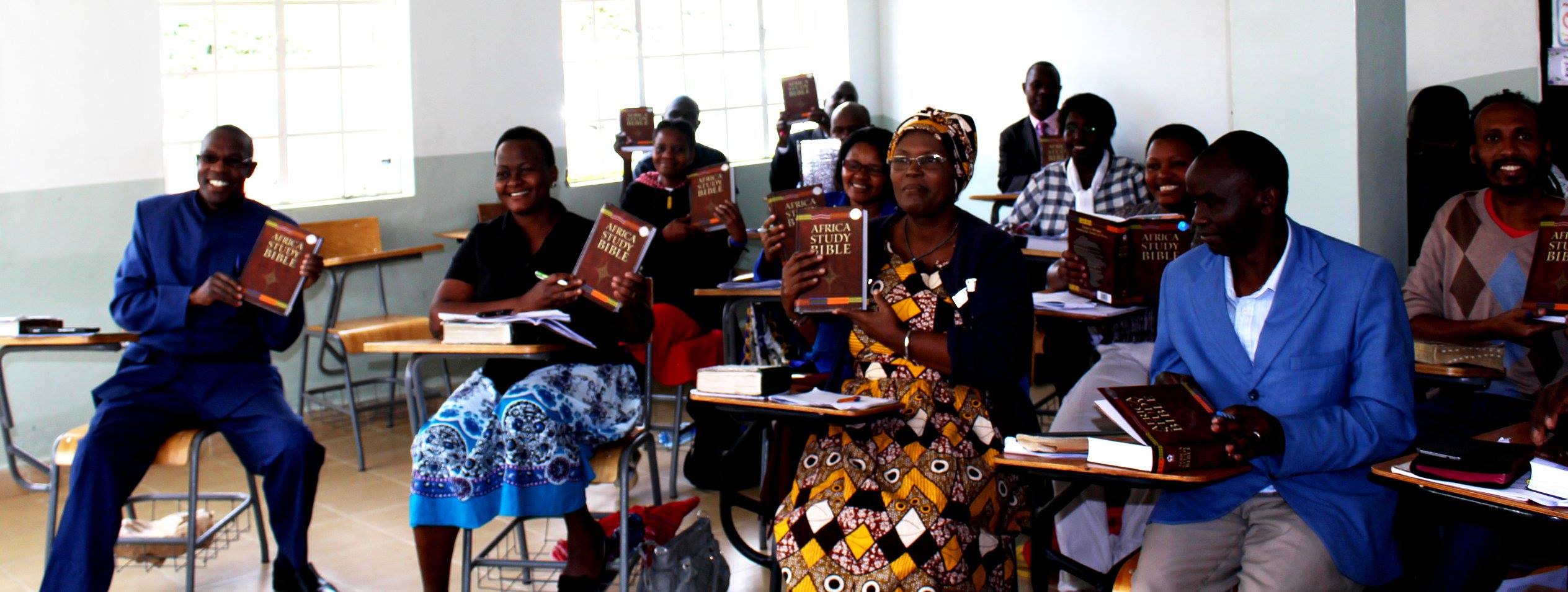
Resource highlight: Oasis Africa Study Bible & App
October 27, 2019
Will “Christian” mean “African” someday?
November 12, 2019Teach the Church to Pray

Reshared with permission from the author
Learning to Pray With Scriptures Praying with Scripture is not a new concept. The use of Scripture for prayer has been around since the early church fathers and it gained momentum during the Monastic period. Some Christian traditions kept this practice in their liturgical worship and Lectio Divina. However, this practice is generally lost to most of us evangelical Christians due to our disproportionate emphasis on spontaneous prayer, thinking that this approach to prayer is much more sincere than prayers that are being read out.
The Four Movements in Prayer
This book combines methods in prayer from various Christian practices that would lead readers to follow four movements in prayer namely;
- Seek God’s Agenda
- Study the Scripture
- Scribble a Prayer
- Submit to the Spirit’s leading
The end result of every prayer should be obedience to God; whether He wants us to act, wait, or to pray more, our ultimate goal should be obedience to His will. Prayer is not about making God answer my request, but about making my desires aligned with His will.
Seek God’s Agenda in Prayer
Perhaps most of us don’t benefit from our prayer time because we treat it like an errand that needs to be done with, so we could proceed with the more important tasks of the day.
Here are some websites that advocates the use of Scripture for prayers.
http://www.strategicrenewal. com/2018/02/20/prayer-guide-psalm-16/ and https://www.crosswalk.com/faith/prayer/prayers.
Lectio Divina was practiced by the Benedictine monks. Scripture is read meditatively in communion with God.
E. M. Bounds says, “Prayer should not be regarded as a duty which must be performed, but rather as a privilege to be enjoyed, a rare delight that is always revealing some new beauty.” Oswald Chambers affirms, “Prayer does not fit us for the greater work; prayer is the greater work”.
So how do we make the most of your prayer time?
A. Settle Down. Take a moment to be silent before the presence of God. Resist the urge to rush through it. This is an essential factor in a meaningful time with God. By slowing down, we force our spirit to engage with the Spirit of God. Mother Teresa affirms, “God speaks in the silence of the heart. Listening is the beginning of prayer.” Once you sense that you are settled, and you are no longer fighting the urge to hurry, then you are ready to listen.
B. Seek God’s agenda. After settling down, then you can pray something like this, This kind of prayer compels us to be in a posture of learning, receiving, and humility. Again Mother Teresa reminds us, “Prayer is not asking. Prayer is putting oneself in the hands of God, at His disposition, and listening to His voice in the depth of our hearts.” This approach to prayer is a fitting reminder of God’s sovereignty over us. Too often, people go to God in prayer as if He is a genie in a lamp who is supposed to grant all their wishes. We need to constantly remind ourselves that He is the LORD and the LORD is God. We are merely his servants and that prayer is not about getting what we want, but asking what God wants from us.
C. List down the things that come to your mind as items for prayer and consideration. Not everything that comes to your mind is necessarily God’s will, however, it could always serve as a point of conversation with God and in seeking his true will.
Father God, I come to You with all humility and surrender. Please lead our conversation today. I am ready to listen to You. May Your agenda be my only agenda for today. Amen.
Often, these impressions lead to a deeper issue that God had been pointing out to you. So, always keep a pen and a journal or a notebook with you when you pray. Before proceeding, ask the Lord to reveal to your mind, his agenda in prayer. List down any issue, names of people, and passages of Scripture, pressing needs, or events that come to your mind as prayer agendas.

2. Study the Scriptures After having written down God’s prayer agenda, you may now turn toward Scripture for guidance, meditation, and fresh insights from God. In the same way, ask God to lead you to a Scripture passage by praying something like this. After having prayed for God’s leading, then be attentive to any story, verse or references from the Scripture that the Lord may bring to your mind in relation to our prayer list. Once you know what passage to read, read it carefully a few times. Be aware that some passages may point to other passages, so learn to be patient and to listen to the Spirit’s leading.
Father God, Your Word brings life. Breathe life into me. Please lead me to a particular passage that could teach me new truths about You, or uncover issues in my life, or a command or principle that You would want me to obey. Your Word affirms, that “all Scripture is God-breathed and is useful for teaching, rebuking, correcting and training in righteousness, so that the man of God may be thoroughly equipped for every good work” (2 Timothy 3:16-17).
May Your Word accomplish its purpose in my life today. Lord Jesus, please teach me, rebuke me, correct me and train me in Your righteousness. Satisfy my hunger for Your righteousness (Matthew 5:6). May Your Word equip me for every good work You intend to accomplish through me. In Your precious name, I pray. Amen.

Take note of any lesson, principle, new perspectives or even connections that come to mind that may arise out of your reading in relation to your situation and context. The Word of God should inform and direct our prayer if we want it to be consistent with God’s will for our lives. Furthermore, praying with scripture enables us to pray with our minds not just our spirit as the Apostle Paul said, “I will pray with my spirit, but I will also pray with my understanding; I will sing with my spirit, but I will also sing with my understanding” (1 Corinthians 14:15, NIV)
3. Scribble a Prayer As Evangelicals, we have become too accustomed to prayers that are impromptu or spontaneous. There is a sense of freedom in spontaneous prayers, but there is also a sense of foolishness at times. I have heard too many of these spontaneous prayers that are shallow and even senseless. We can avoid this when we take the time to think through our prayers and to write them down.
Therefore, cultivate the habit of writing down your prayers as I have done above. This is a good discipline to develop. Writing down your thoughts help you think better and clearer. As William Zinsser said, “Writing is thinking on paper.” It is an important step in developing the habit of journaling. Writing down your prayers help you think clearly about God’s word in light of your situation and appreciate how God has answered your prayers.

4. Submit to the Spirit’s leading The Lord is always at work around us, in us, and through us. If we stop for a moment and sincerely ask God to reveal to us what He wants us to do, he will often direct us to a specific course of action or to an answer we needed most. Whenever I ask people, “What do you think God wants you to do?” in the majority of cases, they already know what needs to be done but are not willing or just not ready to follow Jesus.
When I asked a student of mine this question, she burst in tears and said, “I know God wants me to quit my work and go to full-time ministry.” “How long have you been carrying this burden?” I asked her. She replied, “Three years.” That very week, she resigned from her work and entered full-time seminary training.
Too often, at church prayer meetings, we simply rush through the list of prayer request without bothering to ask God how and what He would want us to do. As a result, we leave the prayer meeting without any shred of affirmation or peace that God has answered our prayers. We are no better off than how we were before we convened for prayer, and to be frank about it, our prayer meetings end up being a waste of time. Submitting to the Spirit’s leading is a critical part of our prayer walk.
Take the time to ask God, “Lord, what is it that You would have us do with regards to this situation?” Then spend the time in silence as you wait on the Lord to reveal to you a course of action to take. Sometimes, the situation or issue we are concerned with is not at all important to God and He may reveal to you something that is really important to Him.
Whenever I sense that God would rather have me pray and do something totally different, I get excited because I know I am praying within his will. And remember, genuine prayer does not end in “Amen,” but ends in obedience. When you genuinely ask God what He would have you do, be ready to receive an answer and all the more, be ready to obey!


